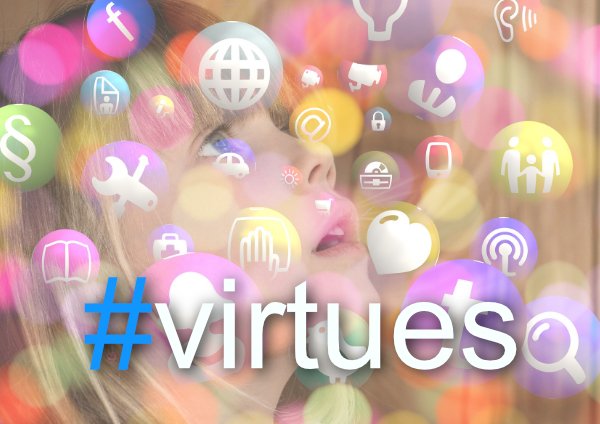
Twitter litter. That’s what cultural gurus are calling posts no one cares about. These highly insignificant tweets become Internet garbage. Yet so much of this “online litter” offends and prompts visceral responses. We only need to look at our social media feeds to see the opposite of virtue being expressed. So many times I feel disturbed, irritated, or frustrated after scrolling through social media and question myself why I feel like I do. I realize that this virtual litter disturbs my peace or feeds my vices. Many people I know have pulled away from Facebook or Twitter altogether because of offensive posts or belligerent responses to others’ posts. Sometimes I wonder if people even think before they communicate their inmost thoughts for the entire world to see or if it comes from sheer impulse. How is the good life expressed in this contentiousness? How is peace and serenity communicated in this cybernetic world of virtual litter? When we consider God’s presence in our lives and his grace in the world, it begs us to stop and reflect on our contribution to this global communications network of ideas and emotions.
Everyday Grace
How we see and understand the human person and the experience of grace within our world is reflected in the everyday circumstances of life—“grace building on nature,” as Aquinas would say. We are each called to address the deepest yearnings of the human soul, which, ultimately, is the desire for God. How we human beings express those yearnings deserves our consideration. Looking to popular culture, we get a glimpse of what human beings desire most. Over and over, we struggle with the existential need for connection, communion, and intimacy, as well as for meaning and purpose. All these needs are present within the popular culture’s artifacts – especially in the proliferation of social media.
Pope Benedict XVI recognizes these essential needs of the human person when he says, “Seeing with the eyes of Christ, I can give to others much more than their outward necessities; I can give them the look of love for which they crave.” We want to mean something to someone. We long for a connection that is deeper than our Snapchat sharings. We crave human touch and purpose. The culture is a place where existential longings are expressed especially through movies, TV, music, advertising, and social media. Art dares to struggle with the hard things of life. The world is searching and we ourselves are searching along with it. There are many examples of this searching in movies, TV shows, and social media posts. Sometimes media show the opposite of grace and virtue—the sinfulness of humanity—but they also depict human longing for redemption and the need for grace and fulfillment.
Authentic Understanding
In order to better understand the wider culture’s yearnings and struggles, sometimes it helps to step out of our Catholic worldview. We may think we know what these struggles are, but do we really? We live in a media culture, but do we really understand it? Einstein said, “What does a fish know about the water in which he swims all his life?” Marshall McLuhan, referencing this and other quotes of Einstein said, “We don’t know who discovered water, but it wasn’t a fish.” McLuhan continues to question the very human inclination to freely offering our opinions about everything and anything, especially about the culture. He says, “A point of view can be a dangerous luxury when substituted for insight and understanding.”
This is a poignant comment in our social media age when everyone has an opinion about everything and shares it on the Internet freely, sometimes without tact or sensitivity. A way to bring our transformative experience of God into dialogue with the popular culture is to use the media mindfulness strategy. This method of critical inquiry is essential, especially in the age of social media. Asking questions of the media and dialoging with it have become necessary skills for all age groups. Different from traditional media, social media has its own rules and methods of engagement—where, more than ever, we become content creators.
Social Media Challenge
All the media we consume influences our media creations. Questioning and inquiry are essential in the area of social media, especially with youth, but not only youth. Have you ever looked at your social media feed first thing in the morning? Or last thing at night? Have you caught yourself looking at how many likes you received or followers you have acquired? Have you ever posted “online litter,” something that is useless to others? We are probably all guilty. I know I am! What has social media done to us? Has it made us more social? Has it made us more authentic or less so? More engaged or less engaged? More fulfilled or less fulfilled? What is social media taking the place of in our lives? Instead of checking my status, can I take a moment for a gratitude check or to meditate? Am I aware of the persons near me to whom I can reach out with a smile or a greeting, instead of taking a selfie, posting a tweet, or snapping with a friend?
Check out this short film: Are You Living an Insta Lie?
What are the challenges of a digital life? As mentioned above, media mindfulness is a method of inquiry, as Sr. Hosea has been writing about on this blog (click here for the introductory article). Part of this strategy is bringing a virtue ethics into the process of inquiry as a way of balancing it with our values, and most importantly our Christian values. Virtues are putting our values into practice, creating habits of behavior that guide us in our everyday choices, and specifically in our media choices. These habits or virtues can lead to happy and good lives. Is that not what we all desire? Yes, it takes work, just as any talent takes practice. The challenge is to form good habits and grow in respect of others while finding contentment within.
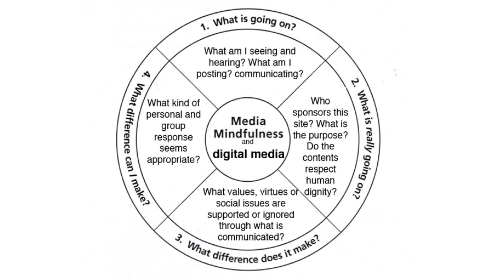
In the media mindfulness strategy, we integrate the living out of the virtues, especially the cardinal virtues of prudence, justice, temperance and fortitude. I offer them to you as a way to integrate our faith into our digital media use and call them the Be-attitudes of social media. If we live these virtues or good habits in our social media use we will grow in kindness, honesty, and peace. Here they are:
Be-Attitudes of Social Media: Virtues for a Digital Age

Be PRUDENT in what you tweet, post, snap or share—T.H.I.N.K. before responding/reacting/communicating: Is it TRUE, is it HELPFUL, is it INSPIRING, is it NECESSARY and is it KIND? “Do to others whatever you would have them do to you” (Mt. 7:12).
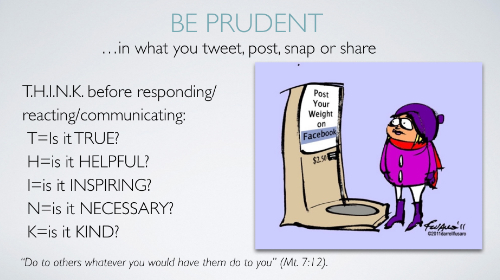
Be JUST in your posts remembering that there are always two sides to a story; justice is about supporting the dignity of each human being who is made in the image and likeness of God. “Blessed are those who do what is right, whose deeds are always just” (Psalm 106:3). An unknown author reminds us, “Beware of the half truth. You may have gotten hold of the wrong half.”
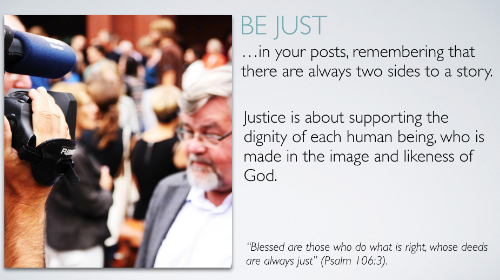
Be TEMPERATE in your digital media use; use technology, don’t let it use you! Spend time interacting with people face-to-face in the physical world and experience the beauty in nature. Use the media that builds up personal relationships. “Make every effort to supplement your faith with virtue, virtue with knowledge, knowledge with self-control, self-control with endurance, endurance with devotion” (2 Peter 1:5-6).
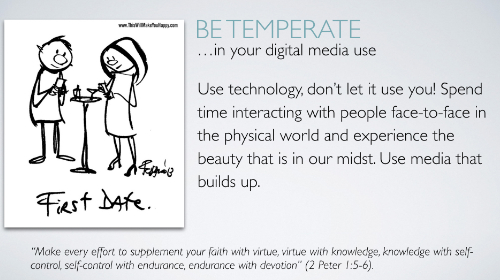
Be COURAGEOUS in the digital media universe. Stop cyberbullying. Stand up for the person being bullied even if that means risking persecution by others. Stand up for what is right! “Be strong and courageous; do not be frightened or dismayed, for the Lord your God is with you wherever you go” (Joshua 1:9).
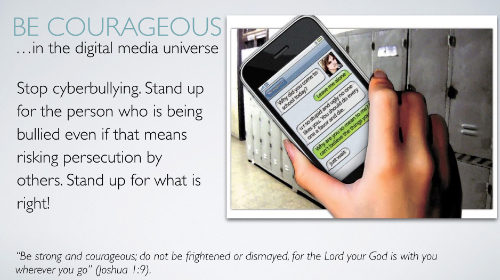
Virtuous Living
Living the virtues brings contentment, as Aristotle would argue. The reason is that virtuous living is about being more authentically human, and we are most human when we give of ourselves in love. Jesus Christ lived love unequivocally, he who is the perfect human being. When we draw out the beauty of humanity through our social media interactions, we become conduits of God’s grace working in the media culture.
Living virtue gives humanity hope. Despite the sinful tendencies of human beings to lie, kill, cheat, bully, and destroy, there is always a glimmer of hope in the soul that cannot be extinguished. Do our social media interactions uplift the human person? Do they bring about a sense of wholeness and inspiration? That desire for something more than this world can offer burns in each human person and leads each one to reach for the good life that can only come when we give of ourselves in love, that is, when we live the virtues that bring true happiness.
About the Author

Sr. Nancy is the Director of the Pauline Center for Media Studies and a Media Literacy Education Specialist. She has degrees in Communications Arts and a Masters in Theology and the Arts from Fuller Theological Seminary. She has extensive experience in the creative aspects of social media, print media, radio and video production as well as in marketing, advertising, retail management and administration.
Sr. Nancy has given numerous media mindfulness workshops, presentations and film retreats around the country to youth, young adults, catechists, seminarians, teachers and media professionals helping to create that dialogue between faith and media. She is a member of NAMLE (National Association of Media Literacy Educators), SIGNIS (World Catholic Association for Communicators) and THEOCOM (Theology and Communications in Dialogue) and board member of CIMA (Catholics in Media Associates). She is the author of a theology of popular culture called, A Sacred Look: Becoming Cultural Mystics from Wipf & Stock Publishing. Sr. Nancy is a theologian, national speaker, blogger and film reviewer.